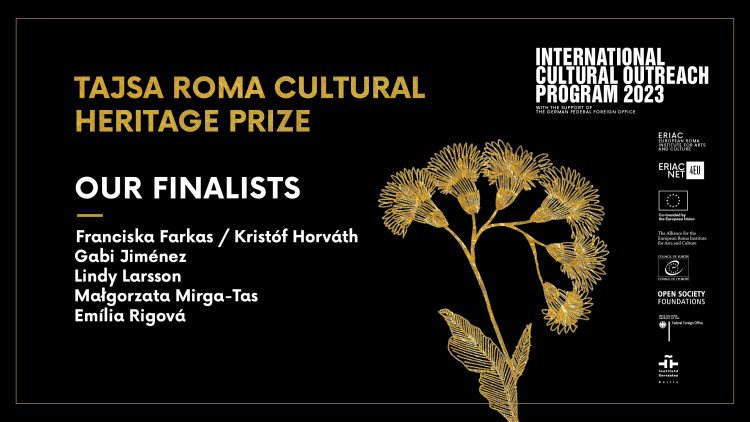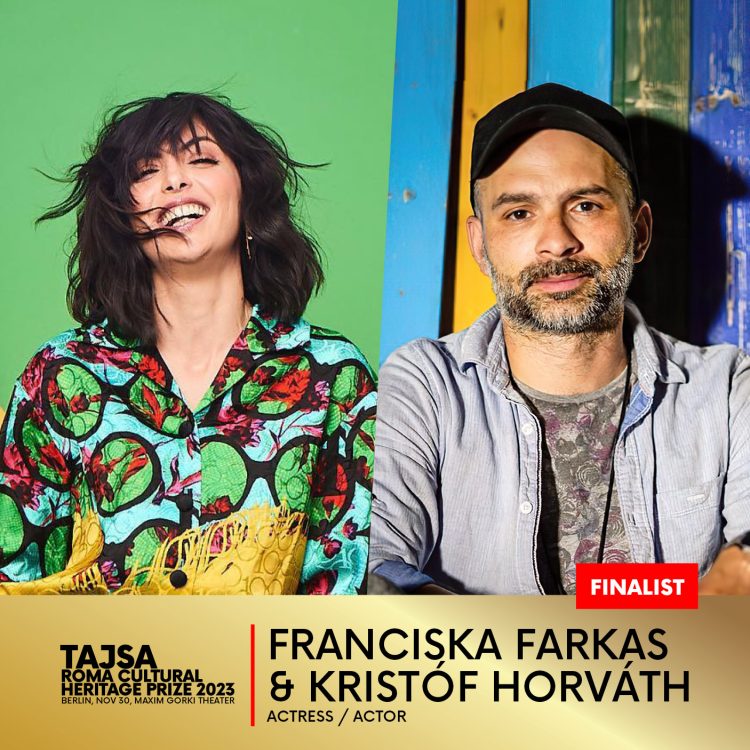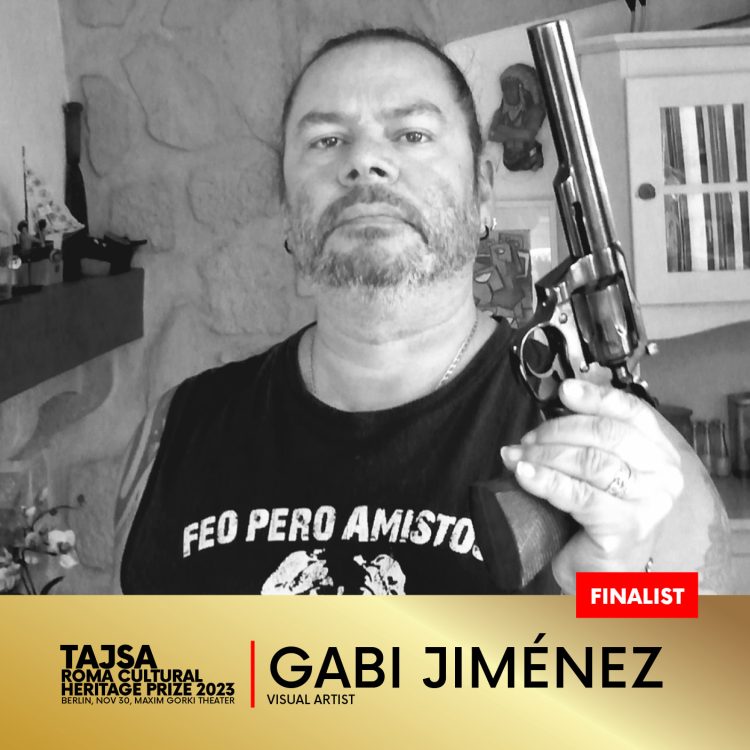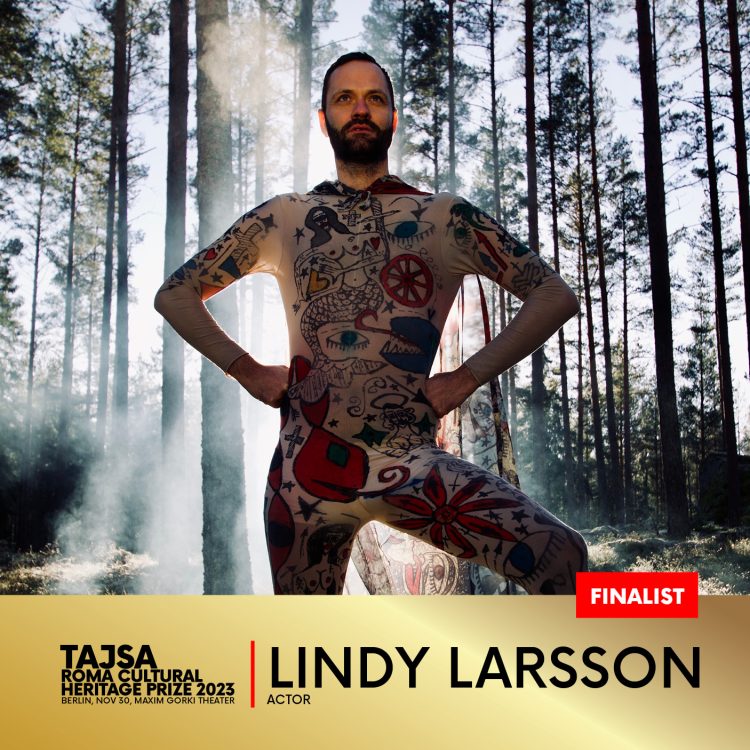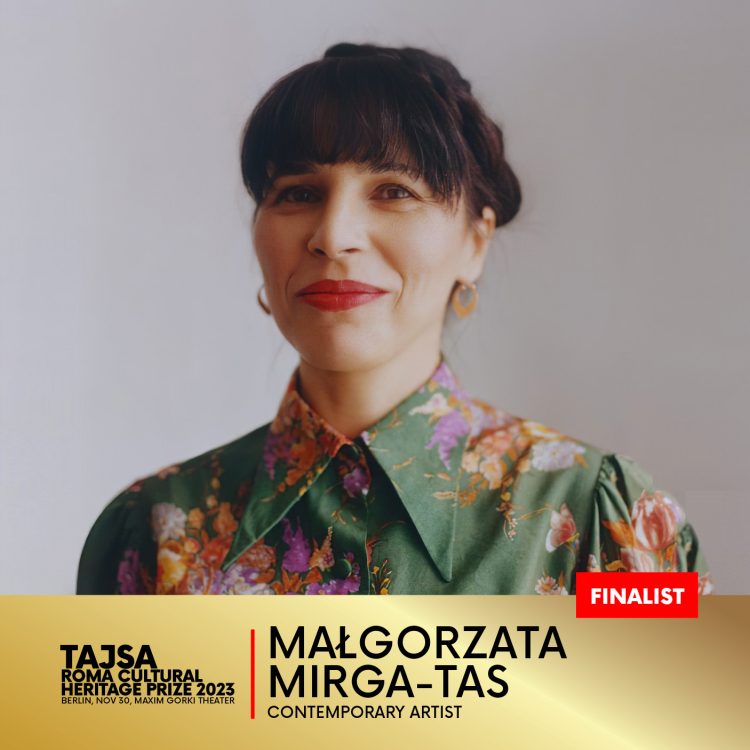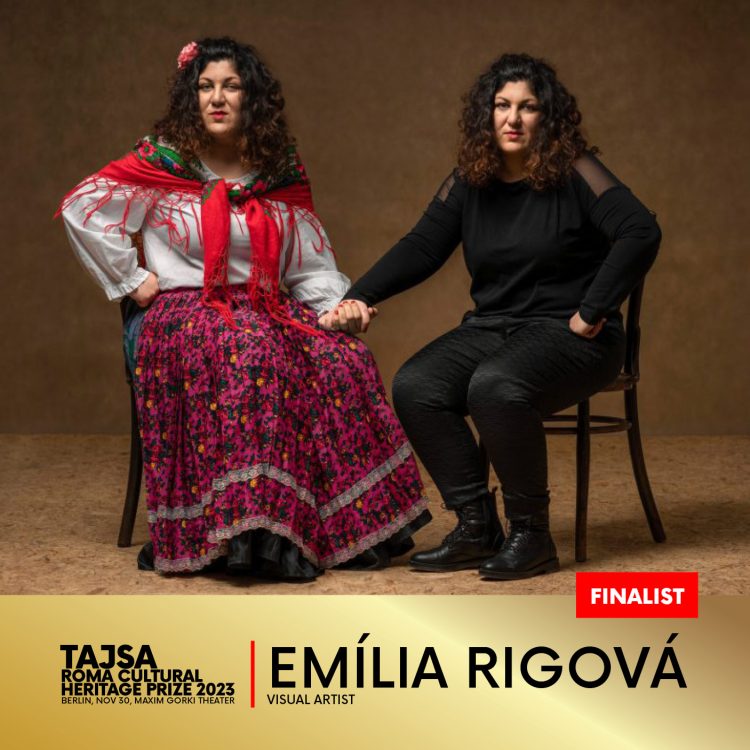Announcement of the Five Finalists for the Tajsa Roma Cultural Heritage Prize 2023
European Roma Institute for Arts and Culture is pleased to announce five finalists for the Tajsa Roma Cultural Heritage Prize 2023
The pre-selection committee is delighted to announce the five finalists for the prestigious Tajsa Roma Cultural Heritage Prize 2023, chosen from over eighty submissions to The European Roma Institute for Arts and Culture (ERIAC).
WE CONGRATULATE:
Franciska Farkas / Kristóf Horváth
Gabi Jimenez
Lindy Larsson
Małgorzata Mirga-Tas
Emilia Rigova
In their discerning selection of finalists, the Jury of the Tajsa Roma Cultural Heritage Prize 2023 has spotlighted remarkable individuals whose invaluable contributions to the contemporary Roma cultural movement are truly exceptional.
Franciska Farkas / Kristóf Horváth, both award-winning actors from Budapest, are notable for their contributions to the world of theater, film, poetry, and talent education. The Jury has nominated them together for their outstanding performance in the movie Three Thousand Numbered Pieces (2022), “a political, cruel and original film spiced with dark humour, which makes an urgently needed and impactful statement against injustice, prejudice, discrimination and racism against the Roma, the biggest European minority”.
Gabi Jimenez, a committed artist residing in France, has consistently addressed social injustices and tragedies, positioning his work at the forefront of the Roma art and culture discourse. One of the exhibiting artists of Paradise Lost, the First Roma Pavilion of the Venice Biennale in 2007, Jimenez has recently sparked interest with his installation “Musée du Gadjo” exhibited at the Mucem in the frame of the Barvalo exhibition (10 May-4 September 2023).
Lindy Larsson, a talented actor and singer from Sweden, has graced major theaters with his diverse roles and has made a significant impact on the stage through his outstanding performances. He was one of the leading actors of the Roma Armee play and member of the Maxim Gorki ensemble since 2020.
Małgorzata Mirga-Tas, the first artist of Roma origin who represented Poland at the Venice Biennale in 2022, is celebrated for her vibrant and self-assured Roma iconography, challenging stereotypes and engaging in a critical dialogue with historical depictions of the Roma community.
Emília Rigová, hailing from Slovakia, has received acclaim for her profound exploration of cultural and social stereotypes, Romani identity, and psychological intricacies through her multimedia art. Exhibiting artist of the Milan Triennale in 2022, her latest show at the Mumok in Vienna was a real breakthrough in her artistic career.
The finalists epitomize the ingenuity, virtuosity, and talent that define Roma cultural producers, each excelling in their respective domains of arts and culture.
The Tajsa Prize is designed to celebrate and honor exceptional individuals who are leading voices in the contemporary Roma cultural movement. It strives to inspire Roma pride and spotlight the creativity, virtuosity, and talent of Roma cultural producers. The recognition extends to those who have excelled in various domains of arts and culture, including but not limited to visual arts, performing arts, literature, photography, film, design, dance, music, fashion, as well as scholarship, knowledge production, critical thinking, and media (journalists, bloggers, media producers, etc.). The ERIAC associate membership entirely sponsors the 2023 Tajsa Prize with an endowment of 10.000 EUR.
The international 5-person Jury includes an ERIAC Board member, three Barvalipe Academy members, and the ERIAC Executive Director. The winner will be determined through anonymous votes by a final jury committee. The winner will be announced during the Tajsa Prize 2023 Ceremony on November 30 at the Maxim Gorki Theatre in Berlin, Germany.
ERIAC invites you to join us on November 30, 2023, for this prestigious award ceremony at the Maxim Gorki Theatre in Berlin, where we will celebrate the exceptional contributions to Roma culture by the five deserving finalists. Take advantage of this incredible night of cultural appreciation and inspiration. Tickets: https://www.gorki.de/en/tajsa-roma-kulturerbe-preisverleihung/2023-11-30-1900
Short bios:
Franciska Farkas
Franciska Farkas is an actress, writer, and drama teacher best known for the movies Threethousand Numbered Pieces (Háromezer számozott darab, 2022), Rocking Chair (Hintaszék, 2022), and Golden Life (Aranyélet, 2022). She won the Platinum Award for Best Actress for the Rocking Chair (Hungary) at the Independent Shorts Awards, Los Angeles in July 2023. She played the voice of one of the main characters of ‘27’ (by Flóra Anna Buda) which won the Palme d’or for best short film at Cannes in 2023. Currently involved in several theater productions, her latest show “Makar Csudra” is based on Maxim Gorki’s work. Notably, she is one of the few Hungarian Roma actresses who openly discuss their origin in public.
After completing high school, Franciska studied as a social worker. Her parents filed for divorce when she was 13, which led her to work and assist her mother. She held various jobs, including modeling, housekeeping in a hotel, waitressing, bartending, and more. Due to limited resources and time, she couldn’t attend an acting school initially. However, later on, she completed drama teaching school in 2017. Franciska’s talents have been recognized with awards such as Best Actress at the 14th Hungarian Film Festival Los Angeles (2014) for “Viktoria,” Best Actress at the 48-hour Film Project (2015), and Best Supporting Actress by Hungarian Television Professionals (2016) for “Golden Life.”
Kristóf Horváth
Kristóf Horváth, also known as Színész Bob (Actor Bob), was born and currently resides in Budapest. He hails from a theatrical background, which makes him both drawn to and wary of drama.
His family discouraged him from playing musical instruments, leading him to use speech to pursue a musical passion, albeit uniquely. Kristóf Horváth boasts over 15 years of experience as a theater and film actor, with notable appearances in award-winning films such as “1 hét” (2004), awarded Best Hungarian Short Film by a student jury, “Gyengébb napok” (2008), recognized as the Best Short Film in Hungary, and “Sturmland,” screened at the Berlin International Film Festival (2014).
Additionally, he is a two-time National Poetry Slam Championship winner, founded the Knowledge is Power Group, a nationwide talent education system, and conducts drama courses for children. Driven by a fear of being useless, Kristóf Horváth is determined to transcend the notion of “l’art pour l’art” and strives to be a “useful artist” in his constant battle with himself.
Gabi Jimenez
Gabi Jimenez lives and works in France. He has long been committed to the memory of tragedies and social injustice and to the visibility of the lives of those whom we do not speak of. He is one of the leading artists from discriminated minorities who helped develop an international art movement from the First Roma Pavilion at the 2007 Venice International Biennale, Paradise Lost, which featured Jimenez’s work. In 2011, he held the first international seminar on Roma art and culture in Spain. In 2013, the French state bought two paintings depicting “Le Grand Paris” from him after his exhibition at the DIHAL – Interministerial delegation for accommodation and access to housing in Paris.
In 2014, Gabi Jimenez received the Painting and Plastic Arts prize from the Spanish Ministry of Culture. In the same year, the President of the European Court of Human Rights acquired one of his works, now exhibited in the judge’s room. In 2016, the work Caravan Under Two Cypress Trees was exhibited in San Sebastian (Spain), the European capital of art, during the exhibition Tratado de Paz among more than 300 works by artists such as Goya, Rubens, Murillo, Picasso, Ribera and Sophie Ristelhueber.
Lindy Larsson
Lindy Larsson, born in 1974 in Ljuder, Sweden, is a talented actor and singer. He studied at The University College of Acting in Stockholm and has performed at major theaters in Sweden, including The Royal Dramatic Theatre, Malmö City Theatre, Stockholm City Theatre, Malmö Opera, and Uppsala City Theatre. In 2020, he portrayed Hedwig in “Hedwig and the Angry Inch” at Malmö City Theatre.
Throughout his career, he has taken on diverse roles, from The Leading Player in “Pippin” to Professor Higgins in “My Fair Lady” at Malmö Opera. He’s also played Feste in “Twelfth Night” at The Royal Dramatic Theatre and Frida Kahlo in “Kahlo – The Concert” at Republique in Copenhagen.
Lindy is the lead singer in the Lindy & Bon Bon Band and has received awards such as the Thalia Prize for his role as Carmen at Malmö City Theatre in 2010 and the Såstaholms Film and Stage Art Award in 2011. He has been a part of productions at Maxim Gorki Theatre and a permanent ensemble member there since the middle of the 20/21 season. Notably, his performance in “Tschandala/Tattaren” in 2023, backed by the Bon Bon Band, addresses issues of exclusion, abuse, survival, and healing, shedding light on a forgotten part of Swedish history. He was honored with the Swedish Theatre Critics annual prize in 2022 for this groundbreaking work.
Małgorzata Mirga-Tas
Małgorzata Mirga-Tas (b. 1978 in Zakopane, Poland) is a Polish-Roma artist and activist. In her works she addresses the issues of anti-Roma stereotypes, building an affirmative iconography of Roma communities. She often depicts everyday life: relationships, alliances and shared activities. The artist’s vibrant textile collages are created from materials and fabrics collected from family and friends, which imbues them with a life of their own and a corresponding immediacy. Patchworks made of curtains, jewellery, shirts, and sheets are sewn together to form so-called ‘microcarriers’ of history, just as resulting images revise macro perspectives.She graduated from the Faculty of Sculpture at the Academy of Fine Arts in Cracow (2004). Her works have been presented in solo and group exhibitions worldwide, including: at Uffizi (2023), Bruecke Museum (2023), Andalusian Center for Contemporary Art (2023), The Haus der Kulturen der Welt (2023), the 14th Gwangju Biennale (2023), at the Göteborgs Konsthall (2023), at the 59th Venice Art Biennale (2022), documenta15 (2022), at the International Cultural Center in Krakow (2022), at the Guangzhou Triennale in China (2022), the 11. Berlin Biennale (2020), the Art Encounters Biennale in Timișoara (2019, 2021), the 3rd Autostrada Biennale in Prizren (2021), the Moravian Gallery in Brno (2017), the Polish Sculpture Center in Oronsko (2020), the Museum of Modern Art in Warsaw (2020), the Rautenstrauch-Joest-Museum in Cologne (2021). She lives and works in Czarna Gora.
Emília Rigová
Emília Rigová aka Bári Raklóri (born 1980) is a visual artist from the Slovak Republic. In addition to her engagement with art, she teaches art courses (object, multimedia, inter-media) at Matej Bel University in Banská Bystrica. For Rigová, an object in the form of an installation as a performance or a site-specific intervention is a basic element of her art language. Further, she expresses herself through the 2D interface of computer graphics, informed by the fundaments of classical painting. Concerning the content of her work, she explores intersubjectives of emotion modified by a specific socio-cultural environment. The main themes of her works are cultural or social stereotypes, alter ego, Romani identity, and psychological shadows. She is a laureate of the Oskar Čepan Award 2018 and Roma Spirit 2018.
